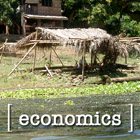
|
EUROPEAN COUNTRIES MAY LENGTHEN WORK WEEK The New York Times reports that European countries are reconsidering the 35-hour work week, finding that the shorter hours may be holding back general economic growth. The affinity for shorter hours has been seen traditionally as a shrewd political method for spreading employment by creating new jobs, and has in the past shown overall gains in production, while per-capita productivity remained level or even increased. Now, to compete with workers from 10 new EU member states to the east, in a market strained by low-cost labor in Asia and elsewhere, Germans are said to be working longer. As much as 20% of the UK workforce may be working over the EU mandated maximum of 48 hours per week, in 2002. Some believe European culture itself hinges on these responses to globalization. The old story is that Europeans "work to live" while Americans "live to work". While simplistic in nature, this view considers the higher premium Europeans place on individual and community leisure as a vital social value. The Times points out that labor pressures are coming less from productivity considerations and more from the temptation of corporate employers to cut costs by shipping jobs to cheaper labor markets in Eastern Europe or overseas. Siemens has renegotiated a contract requiring workers to put in 40 hours instead of 35, for the same pay. A poll has shown that German workers believe longer hours may be the best means of preventing outsourcing, placing momentum on the side of corporate negotiators. But that poll doesn't test the motivation driving that perception by workers, who may not agree in principle with the situation. Their sentiment may be driven as much by skepticism aabout management as by belief in productivity claims. Others cite chronic slow-growth in major European economies, likely due to intense competition from Asia and the EU requirement of limited government debt, which requires constantly increasing tax revenues to keepu up with any amount of economic growth. [For more: NYT] |
|||||||
|
||||||||
